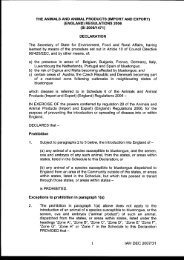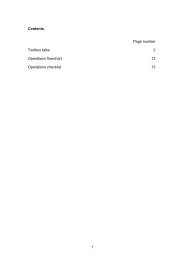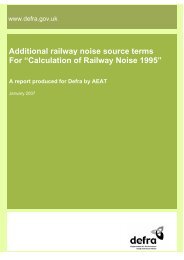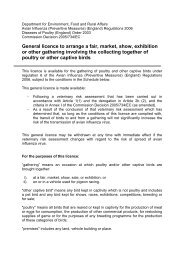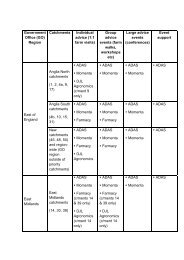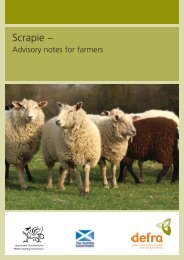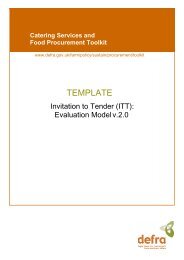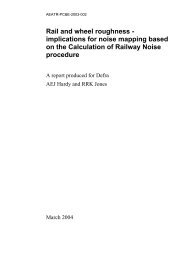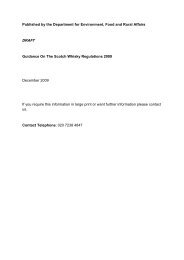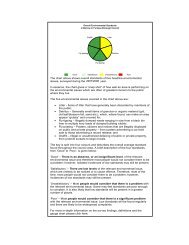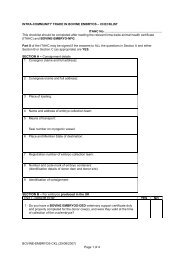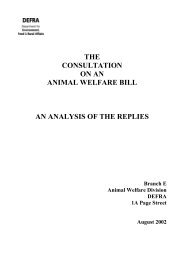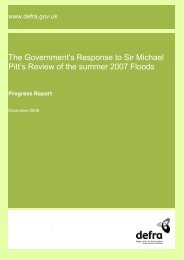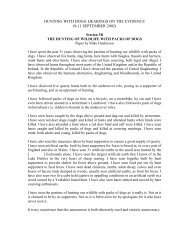Review of the Food-borne Zoonoses Research ... - ARCHIVE: Defra
Review of the Food-borne Zoonoses Research ... - ARCHIVE: Defra
Review of the Food-borne Zoonoses Research ... - ARCHIVE: Defra
Create successful ePaper yourself
Turn your PDF publications into a flip-book with our unique Google optimized e-Paper software.
Project code: OZ0609<br />
Project title: Determining <strong>the</strong> role <strong>of</strong> maternal antibodies in <strong>the</strong> lag<br />
phase <strong>of</strong> Campylobacter jejuni infection in chickens.<br />
Start date (dd/mm/yy): 01/05/2005<br />
End date (dd/mm/yy): 31/05/2006<br />
£50,012<br />
Total cost:<br />
Affiliation: Veterinary Laboratories Agency<br />
Sub-contractor(s):<br />
Abstract <strong>of</strong> research<br />
Campylobacter jejuni is <strong>the</strong> leading cause <strong>of</strong> bacterial enteritis in <strong>the</strong> UK. The handling<br />
and/or consumption <strong>of</strong> contaminated poultry meat is believed to be a risk factor. The<br />
avian intestine is considered <strong>the</strong> natural environment for <strong>the</strong> organism, and up to 90% <strong>of</strong><br />
poultry flocks in <strong>the</strong> UK are colonised asymptomatically. Thus, reduction or elimination <strong>of</strong><br />
<strong>the</strong> organism in poultry in order to reduce <strong>the</strong> number <strong>of</strong> human cases is an objective <strong>of</strong><br />
DEFRA and FSA. A number <strong>of</strong> intervention strategies have been proposed, including<br />
increased bio-security, vaccination and competitive exclusion. Increased bio-security<br />
alone has so far failed to consistently reduce <strong>the</strong> extent <strong>of</strong> colonisation, so a multipronged<br />
approach would seem to <strong>of</strong>fer <strong>the</strong> most promise. Commercial birds tend to<br />
exhibit a lag-phase <strong>of</strong> infection, wherein <strong>the</strong>y usually remain uncolonised during <strong>the</strong> first<br />
2-3 weeks <strong>of</strong> life. Thereafter <strong>the</strong> organism spreads rapidly through <strong>the</strong> flock. The lagphase<br />
represents a window-<strong>of</strong>-opportunity to apply intervention strategies. Moreover,<br />
understanding <strong>the</strong> under-lying mechanisms could help in <strong>the</strong> development <strong>of</strong> successful<br />
strategies. One likely contributory factor to <strong>the</strong> lag-phase, maternally-derived immunity,<br />
was investigated. Previous DEFRA-funded work indicated that <strong>the</strong> susceptibility <strong>of</strong><br />
commercial birds to colonisation is inversely proportional to <strong>the</strong> levels <strong>of</strong> anti-C. jejuni<br />
antibodies present in <strong>the</strong> chicks. These antibodies are vertically transmitted from infected<br />
breeder hens. Their levels decline to background during <strong>the</strong> first 3-4 weeks <strong>of</strong> life. The<br />
role <strong>of</strong> maternal immunity was studied by looking at <strong>the</strong> susceptibilities to colonisation <strong>of</strong><br />
chicks derived from SPF and commercial flocks and from experimental hens colonised<br />
and uncolonised by C. jejuni.<br />
<strong>Review</strong> summary<br />
The role <strong>of</strong> <strong>the</strong> humoral antibody response, including passive transfer <strong>of</strong> maternal<br />
antibodies, remains unclear, making development <strong>of</strong> a vaccine to prevent poultry<br />
colonisation with Campylobacter more difficult. This project has contributed to filling this<br />
knowledge gap, confirming that maternal antibodies play a role in <strong>the</strong> colonisation lag<br />
phase, but that o<strong>the</strong>r unknown factors are also involved. It has also shown that any<br />
exposure <strong>of</strong> very young chicks to campylobacter will result in colonisation. The results <strong>of</strong><br />
this work have assisted in formulation <strong>of</strong> policy, suggesting that attempting to keep<br />
breeding stock free <strong>of</strong> campylobacter may not be a useful strategy in <strong>the</strong> effort to reduce<br />
human campylobacteriosis.<br />
83



